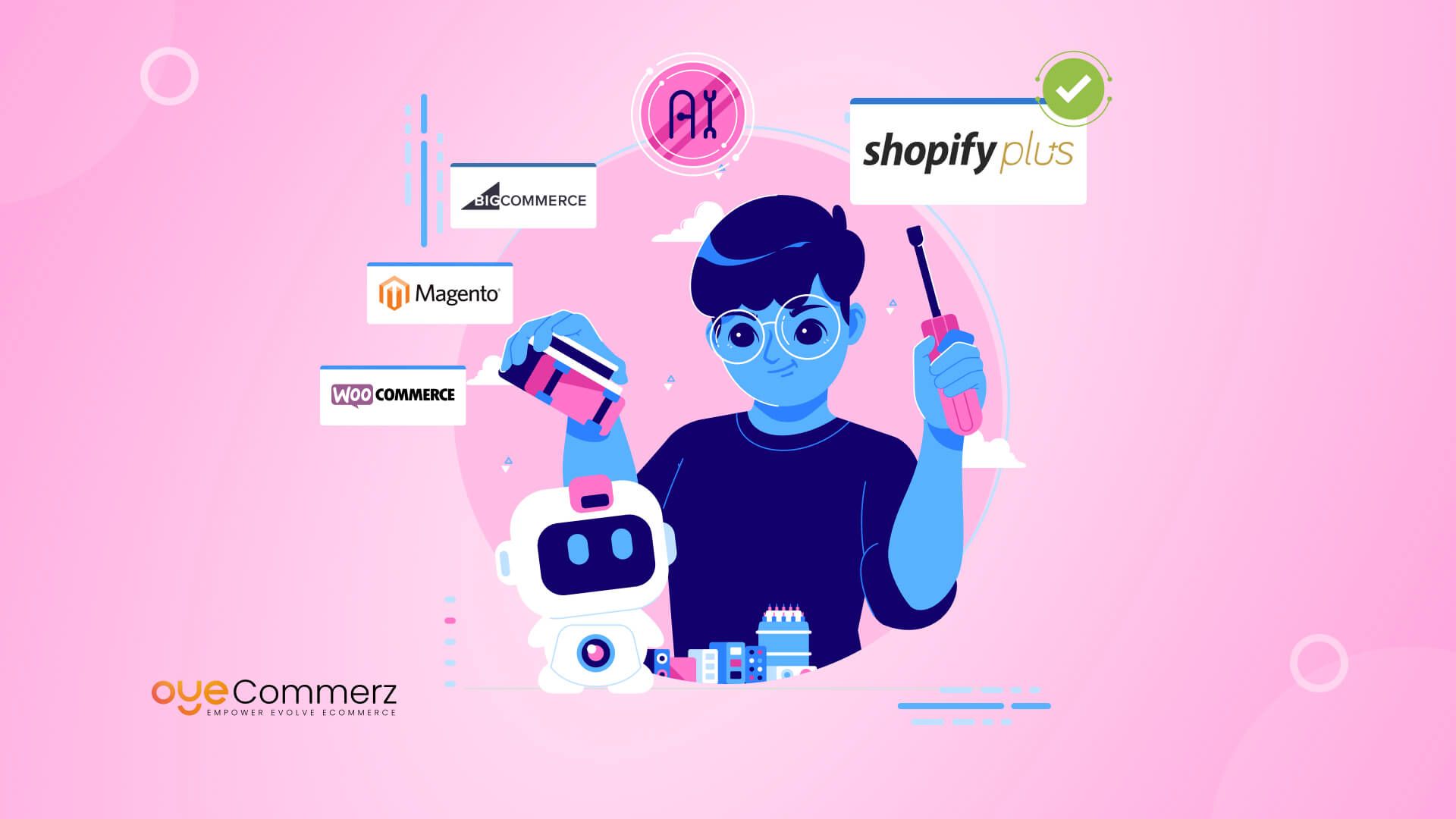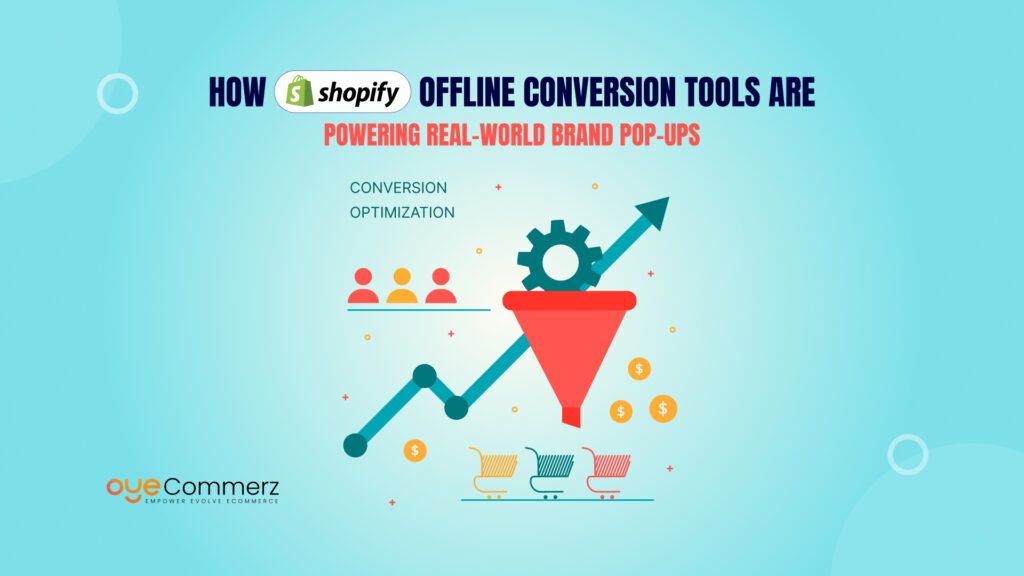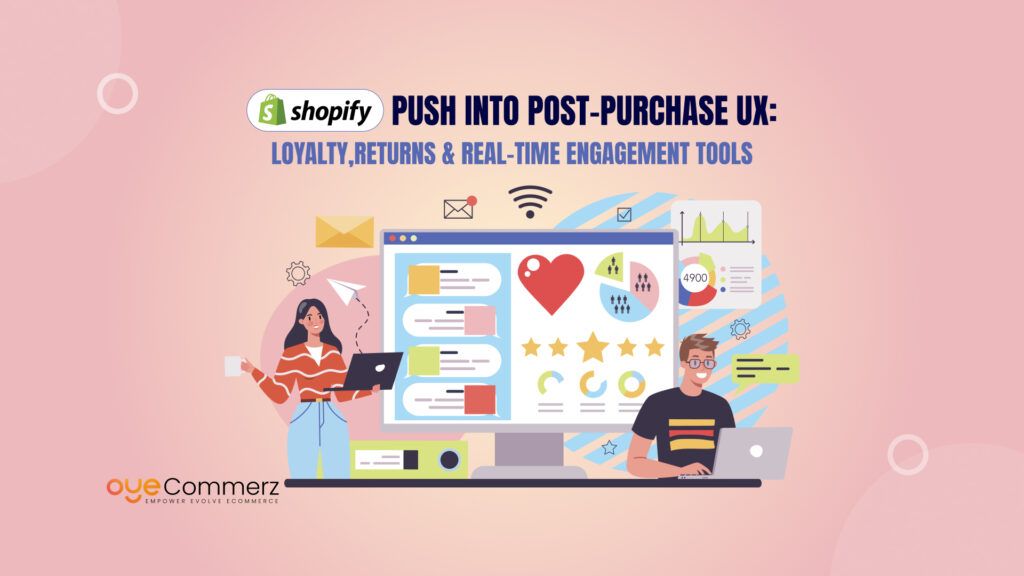Have you noticed that more and more businesses are leaving WooCommerce, Magento, and BigCommerce behind to join Shopify Plus? Why is this shift happening if you’re already running a Shopify store? The answer lies in AI-powered personalization. Businesses making the switch to Shopify Plus have seen up to a 75% increase in customer engagement and sales within just a few months.
The reason? Shopify Plus uses AI to build real customer connections. Businesses shifting from WooCommerce to Shopify migration gain smarter personalization. It’s not just about technology, but about understanding shoppers better. This change makes online experiences more engaging and effective.
Table of Contents
ToggleThe Shifting Sands of E-Commerce Platforms
The e-commerce sector continues to grow explosively, with global sales expected to exceed $8 trillion by 2026. As this market expands, consumer expectations are becoming more personalized, and businesses must adapt to these changing needs. With this shift, the power of AI-driven personalization has become a key factor for businesses striving to offer customized shopping experiences. As a result, more merchants are moving to Shopify Plus, recognizing its capabilities in delivering this personalized touch.
An Overview of Key E-Commerce Platforms
Different e-commerce platforms cater to varying business needs, each with its strengths and drawbacks:
- Shopify Plus: This platform provides a comprehensive solution for businesses looking to scale. It offers powerful customization tools and a focus on individual customer engagement.
- WooCommerce: WooCommerce is ideal for small to mid-sized businesses but requires technical expertise. Many migrate to Shopify for easier scalability and automation.
- Magento: Known for its adaptability, Magento is suited for large companies, though it demands considerable resources and time for effective setup and maintenance.
- BigCommerce: While designed for mid-sized businesses, BigCommerce offers scalability and a range of built-in features, but its approach to personalization is more limited compared to Shopify Plus.
How AI is Shaping E-Commerce
The integration of artificial intelligence is fundamentally changing how businesses operate and interact with customers. Here’s how it’s being applied:
- Personalized Product Recommendations: AI uses data to make smart product suggestions based on a customer’s browsing history, previous purchases, and other behaviors.
- Customized Website Content: AI adjusts content dynamically as users interact with the site, presenting information, products, or promotions that resonate with their interests.
- Predictive Insights: AI tools predict customer behavior, helping businesses adjust their offerings based on future demand, increasing relevance and optimizing sales strategies.
The Real Struggles of Personalization in WooCommerce, Magento, and BigCommerce
Personalization is no longer a luxury in e-commerce it’s an expectation. Customers want shopping experiences that feel tailor-made for them. However, businesses using WooCommerce, Magento, or BigCommerce often run into real obstacles that make this difficult. Let’s take a deep dive into the biggest challenges and why they matter.
1. Scattered Customer Data
Customer data is the foundation of personalization, but managing it is easier said than done.
- Information is spread across multiple tools – CRM systems, email marketing platforms, order histories, and analytics tools don’t always sync well.
- Lack of a unified customer view – Without all customer interactions in one place, predicting their needs or preferences becomes guesswork.
- Missed opportunities for recommendations – If the system can’t track past purchases or browsing behavior correctly, it fails to offer relevant suggestions.
2. Heavy Dependence on Developers
WooCommerce, Magento, and BigCommerce offer flexibility, but that flexibility comes with a cost—technical complexity.
- Customization requires coding skills – Unlike plug-and-play solutions, setting up tailored features often means hiring a developer.
- Small changes take too long – Need a simple tweak? It might require editing code or hiring help, delaying important improvements.
- Updates can break custom features – Platform updates may disrupt existing personalization setups, leading to extra maintenance work.
3. Slow Website Performance on Large Stores
A growing business needs a platform that can keep up, but that’s not always the case.
- Personalized content loads slowly – Dynamic recommendations and customer-specific offers can slow down websites if not optimized properly.
- Increased traffic causes lag – During sales or peak seasons, websites may struggle to handle many users at once.
- More products mean slower searches – As product catalogs expand, search functions can become sluggish, making it harder for customers to find what they need.
4. Costly Third-Party Tools and Add-Ons
Since these platforms don’t have built-in advanced personalization features, businesses must rely on extra tools.
- Monthly costs add up – Recommendation engines, AI-based search, and automation tools often come with separate fees.
- Not all integrations work smoothly – Some plugins conflict with others, causing performance issues or even breaking parts of the store.
- Each tool requires separate management – Businesses must update, troubleshoot, and optimize multiple systems, increasing workload.
5. Security Risks and Maintenance Hassles
Handling customer data responsibly is crucial, but WooCommerce, Magento, and BigCommerce require extra effort to ensure security.
- Manual security updates – Unlike fully managed solutions, these platforms require regular monitoring for vulnerabilities.
- Risk of data leaks – Without proper safeguards, customer information could be at risk, damaging trust.
- Ongoing maintenance eats up resources – Businesses need to dedicate time and money to keeping everything running safely.
Choosing the Right E-Commerce Platform for Personalization
WooCommerce, Magento, and BigCommerce come with real struggles in personalization—complex setups, scattered data, high costs, and constant maintenance. Businesses must weigh these challenges carefully.
Shopify Plus simplifies the process with built-in tools, reliable performance, and fewer technical issues, making it easier to create a personalized shopping experience without extra hassle.
The Benefits of Shopify Plus in the E-Commerce Shift
What is Shopify Plus?
Shopify Plus is a powerful, enterprise-grade e-commerce platform designed for high-growth businesses. It offers advanced features, customizable solutions, and outstanding scalability, enabling businesses to strengthen their online presence and efficiently manage increasing demands. Shopify Plus provides all the essential tools for growth, ensuring top-tier performance and seamless operation as your business expands.
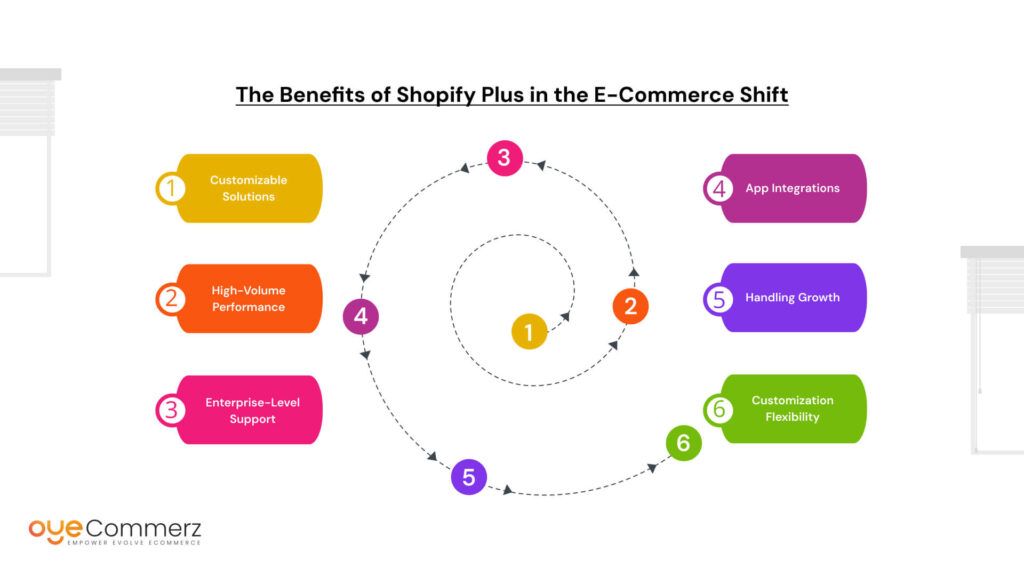
Why Shopify Plus Works for You:
- Customizable Solutions: Shopify Plus allows you to adjust every aspect of your store’s functionality to meet your specific business needs, thanks to its flexible APIs and vast selection of apps.
- High-Volume Performance: Built to handle high traffic and large product catalogs, Shopify Plus ensures your store operates smoothly during peak times, maintaining performance even under heavy loads.
- Enterprise-Level Support: Shopify Plus offers dedicated support teams that provide expert guidance, strategic advice, and resources, helping you scale your business efficiently and effectively.
As businesses aim to keep up with evolving personalization trends, Shopify Plus offers several key benefits that make it the go-to platform for growth:
- App Integrations: Shopify Plus seamlessly integrates with a range of tools designed to enhance personalization, from predictive data models to customized product recommendations, empowering businesses to offer a tailored shopping experience for each customer.
- Handling Growth: Shopify Plus is built to scale with your business, accommodating growth without compromising on performance, and ensuring that you can maintain a personalized experience for every shopper.
- Customization Flexibility: Shopify Plus provides businesses with the flexibility to modify the look, feel, and functionality of their stores, ensuring a seamless alignment with brand identity and customer expectations.
The Road Ahead for E-Commerce Personalization
E-commerce is evolving, and businesses must adapt by offering personalized experiences. AI tools are key to delivering customized recommendations and engaging content. Shopify Plus makes it easy to leverage AI, ensuring your brand stays ahead in this competitive market.
Key Highlights:
- AI-Driven Personalization: Deliver tailored recommendations and content to engage customers.
- Customizable Solutions: Shopify Plus offers endless customization to meet your unique needs.
- Scalable Growth: Easily scale as your business expands, with a platform built for performance.
- Seamless Integration: Integrate effortlessly with powerful AI tools and apps.
Shopify Plus empowers businesses to provide the personalized shopping experience that today’s consumers demand.
Shopify Plus vs. The Competition: A Quick Snapshot
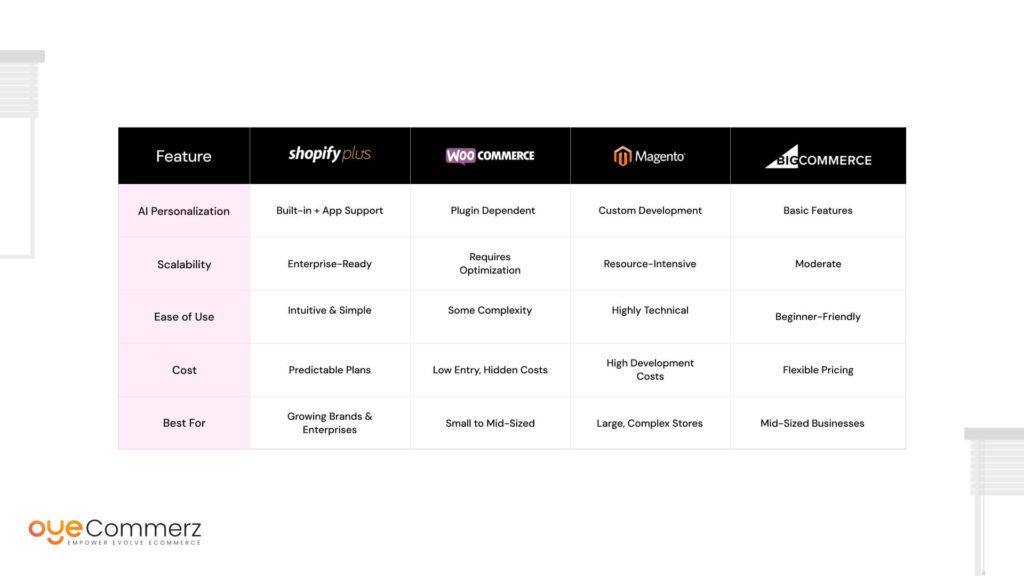
Shopify Plus: A Robust AI-Powered E-Commerce Solution
Shopify Plus combines all the elements needed to succeed in today’s personalized e-commerce environment. From built-in AI features to seamless app integrations and scalable infrastructure, Shopify Plus stands out as the go-to platform for businesses aiming to create dynamic, tailored shopping experiences for their customers.
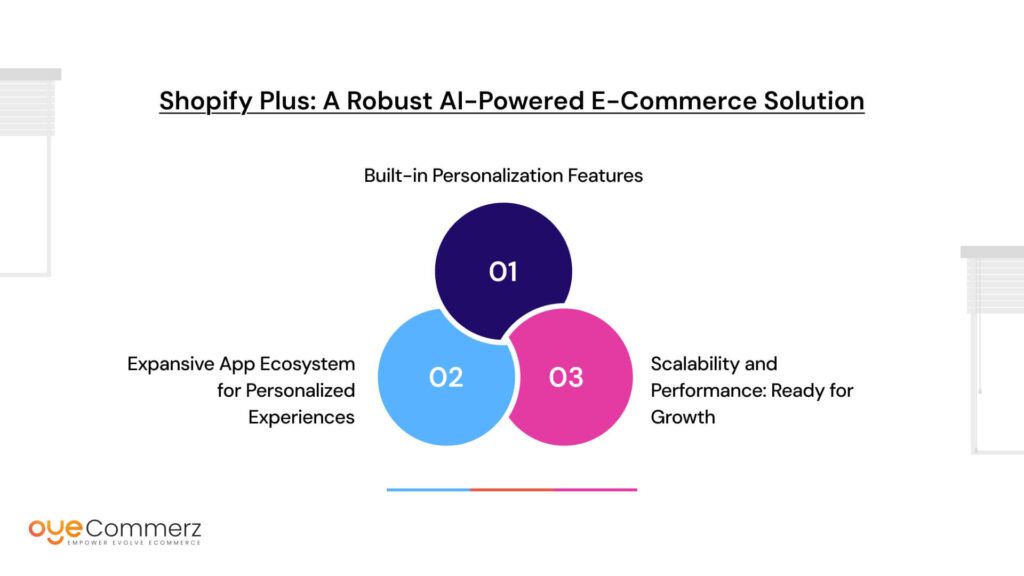
Built-in Personalization Features
Shopify Plus offers a range of integrated personalization tools, such as Shopify Recommendations and Shopify Search & Discovery. These tools automatically personalize product suggestions, making it easier for customers to find exactly what they’re looking for.
- Dynamic product recommendations based on customer behavior.
- Smarter search functionality that helps customers discover products quickly.
Expansive App Ecosystem for Personalized Experiences
For businesses looking to extend personalization features even further, Shopify Plus provides an extensive app ecosystem. Apps like ReConvert and Personalized Recommendations allow you to enhance customer engagement and drive more targeted, meaningful interactions.
- Customizable apps to fit the unique needs of your business.
- Apps that extend and integrate with Shopify Plus’ built-in tools.
Scalability and Performance: Ready for Growth
With Shopify Plus’s cloud infrastructure, businesses can scale easily without worrying about performance dips. Shopify Plus can manage high traffic, large product catalogs, and complex operations with ease—so you can focus on growing your business.
- Designed for high-demand environments, handling large data volumes.
- Instant scalability, making it easy to add products and features without disruption.
Switching to Shopify Plus: A Smart Step for Business Growth
Moving your online store to Shopify Plus is more than just a platform change it’s a chance to improve how your business operates. Shopify Plus brings together advanced tools, reliable infrastructure, and customization options, all without the usual complications of managing a complex e-commerce system. Instead of struggling with slow websites, outdated features, and technical roadblocks, Shopify Plus offers a smoother and more efficient way to run your online store.
How the Migration Process Works
Switching to a new platform might seem overwhelming, but Shopify Plus simplifies the process by ensuring all data, design elements, and functionalities transition smoothly. Here’s a step-by-step breakdown of how it’s done:
1. Creating a Migration Plan
- Every successful move starts with a well-thought-out plan. Before anything is transferred, businesses need to assess their current store, identify pain points, and define goals for the new Shopify Plus setup.
- This stage includes mapping out what needs to be migrated—product listings, customer data, order history, and custom features.
- A detailed plan helps avoid common migration mistakes, such as data loss or broken links.
2. Moving Data Without Complications
- One of the most critical steps in migration is transferring essential data, including product catalogs, customer details, and purchase history.
- Shopify Plus supports structured data imports, ensuring no information is lost during the transition.
- Businesses can use built-in migration tools or professional services to safely move everything without errors.
- Before proceeding to the next step, all data must be reviewed and verified to ensure accuracy.
3. Customizing the Store for a Fresh Look
- A store’s design plays a major role in customer experience, so migration is the perfect time to refresh its appearance.
- Shopify Plus provides various themes that can be adjusted to match the brand’s identity.
- Businesses can tweak layouts, colors, fonts, and features to enhance the shopping experience without relying on extensive coding.
- Shopify Plus also allows for easy integration of additional apps and tools that enhance personalization and improve user engagement.
4. Testing Everything Before the Final Launch
- Before making the new store live, every function must be tested to ensure everything runs as expected.
- This includes testing product pages, navigation, checkout processes, mobile responsiveness, and third-party integrations.
- Any issues that arise can be fixed before launch, ensuring a smooth shopping experience for customers.
5. Going Live with a Stronger Platform
- Once everything is in place, the store can officially switch to Shopify Plus.
- Businesses can immediately take advantage of faster site speeds, better scalability, and advanced features designed for growth.
- After launch, continuous monitoring ensures that the store performs well and delivers a better shopping experience for customers.
Shopify Plus Creates a Better Future for E-Commerce
By migrating to Shopify Plus, businesses eliminate many of the frustrations that come with outdated or complicated platforms. The process is designed to be straightforward, minimizing disruptions while maximizing the benefits of a more powerful e-commerce system. With Shopify Plus, businesses can operate with more flexibility, better customer engagement, and stronger long-term growth.
Oyecommerz: The Experts in Shopify Plus Migration
At Oyecommerz, we specialize in Shopify Plus migrations and helping businesses integrate AI-driven personalization tools. With our deep expertise in the Shopify Plus ecosystem, we guide businesses through every aspect of migration, ensuring that your transition is smooth, efficient, and successful.
- Specialized in AI-powered personalization and data migration.
- Free consultation to assess your business’s migration needs.
Your Next Step: Transform Your E-Commerce Experience
Supercharge your online store with AI-driven personalization on Shopify Plus. Partner with Oyecommerz to access powerful solutions that improve customer experiences, boost business growth, and take your brand to the next level. Let’s transform your e-commerce strategy today.
Take the Leap into the Future of E-Commerce with Oyecommerz
The future of e-commerce is personalized, and now is the time to take action. Are you ready to unlock the full potential of AI-powered personalization for your business? Don’t let outdated platforms hold you back from delivering the experiences your customers crave.
Connect with Oyecommerz today for a personalized, no-obligation consultation. Discover how Shopify Plus can empower your business to create tailored shopping journeys, increase conversions, and enhance customer loyalty all with a platform designed to scale as your business grows.
Let’s transform your business together one personalized experience at a time.
Ready to Migrate to Shopify ? Let Us Help You Make the Switch!
Conclusion
Personalization isn’t just a trend; it’s essential for long-term success. Shopify Plus provides the perfect foundation for creating tailored shopping experiences, improving customer engagement, and driving growth. With Oyecommerz, your Shopify Plus migration becomes effortless, ensuring a smooth transition to a platform that fuels your success. Let Oyecommerz help you take your business to the next level because the future of e-commerce is personal.
Frequently Asked Questions
Shopify Plus leverages AI to deliver real-time personalized product recommendations, dynamic pricing, predictive search, and customer segmentation—enhancing user experience and boosting conversion rates.
Key features include Shopify Magic (AI content creation), personalized email campaigns via Shopify Email, automated upsells/cross-sells, AI chatbots, and integration with top-tier AI analytics and CRM platforms.
Yes. Shopify Plus supports advanced personalization for both B2B and DTC with flexible storefronts, custom pricing, customer-specific catalogs, and AI-driven customer journeys.
Brands report significant ROI improvements due to better targeting, higher AOV (Average Order Value), lower cart abandonment rates, and improved customer retention, all driven by AI-powered experiences.
Yes. Shopify Plus offers migration support tools and partners that ensure seamless data transfer, including customers, orders, product info, and SEO metadata, while maintaining or enhancing your personalization strategy.

